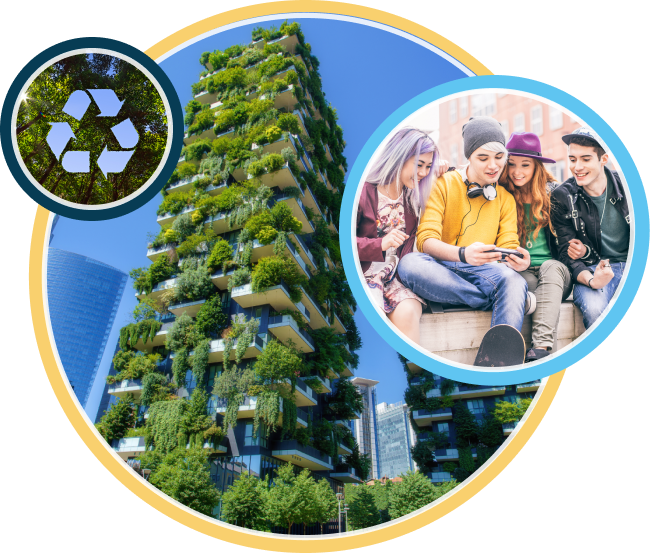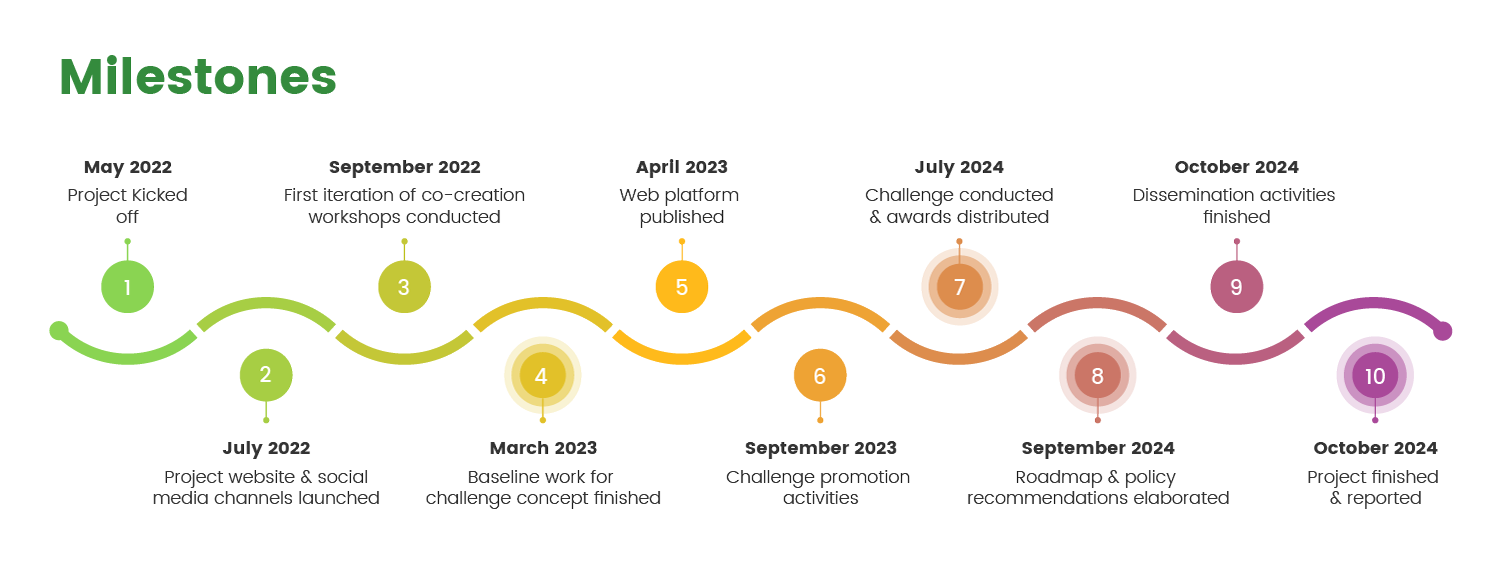Project Objectives
Analyse
curricula, education methods, tools, good practices, and topics to set up the CircularCityChallenge in the context of the circular city approach as a way to address challenges of urbanisation.
Co-Create
an innovative challenge concept, select relevant topics, and define contest categories, formats and prizes in co-creation workshops with education experts, schools, municipalities, and young people
Build
an interactive challenge platform with multifunctional modules including an open information hub with resource directories, an intuitive contest submission system, and awareness channels.
Conduct
the CircularCityChallenges across Europe, focussing on the involved cities, with several contest categories and creative submission types to foster education on circularity and sustainability among young people.
Develop
curricula roadmaps and educational kits with supporting material for schools, and derive lessons learned on and experiences with educating circularity through participative challenges.
Boost
interest in the project in performing targeted, measurable and traceable communication and dissemination efforts to spread the results achieved and outline a sustainable exploitation strategy.
Project Structure

Management
CircularCityChallenge will be fully coordinated and provided continuous progress updates during the project. A management plan, an ethical framework and constant reports will ensure quality throughout the execution of the project.

Review
CircularCityChallenge will identify key stakeholders and carry out an extensive literature review. In addition, it will also collect, aggregate and analyse school curricula, educational tools, methods and resources and conduct expert interviews with educational experts to understand opportunities, barriers and limitations.

Co-Creation
CircularCityChallenge will organise co-creation workshops with different groups and stakeholders to outline a challenge concept, while assessing ethical issues. In addition, instructions for the challenge participants and stakeholders, and topics to be used as inspiration will be elaborated.

Implementation
CircularCityChallenge will design and develop the challenge web platform as well as an Open Information Hub that includes directories, toolkits, and guidelines. In addition, an intuitive challenge submission system and awareness channels fostering awareness of circular economy in urban contexts will be developed.

Execution
CircularCityChallenge will conduct participant workshops to raise awareness, and collect submissions over the challenge web platform. After evaluation, the submissions will be evaluated with quantitative and qualitative parameters. Last but not least, challenge contributors and urban stakeholders will be invited to the Challenge Award Event.

Impact
CircularCityChallenge will evaluate impacts and learning effects in expert interviews and focus groups with different stakeholders and organise workshops with students in the school context to evaluate experiences and visions. As a result, curricula for education for sustainable development and circular economy in secondary schools will be defined, as well as policy recommendations for education for sustainable development and circularity.
Deliverables
D2.1 Report: Key Findings in the Development of Curricula and the identified Challenges
D3.1. Report on Challenge Concept, Topic Selection, Contest Categories and Workshops
D6.1 Impacts and learning effects
D6.2 Student experiences and visions report
D6.3 Curricula
D6.4 Policy recommendations, Roadmaps & guidelines
Project facts
Project name: Creating a Next Generation Participatory Contest for Young People to integrate Circularity in School Curricula
Project acronym: CircularCityChallenge
Project starting date: 1 May 2022
Project end date: 31 October 2024
Project duration: 30 months
This project is part of the ERA-NET Urban Transformation capacities which has received funding from the European Union’s H2020 research and innovation program under grant agreement No. 101003758 (FFG grant agreement No. 42073329).
Project Objectives
Analyse
curricula, education methods, tools, good practices, and topics to set up the CircularCityChallenge in the context of the circular city approach as a way to address challenges of urbanisation.
Co-Create
an innovative challenge concept, select relevant topics, and define contest categories, formats and prizes in co-creation workshops with education experts, schools, municipalities, and young people
Build
an interactive challenge platform with multifunctional modules including an open information hub with resource directories, an intuitive contest submission system, and awareness channels.
Conduct
the CircularCityChallenges across Europe, focussing on the involved cities, with several contest categories and creative submission types to foster education on circularity and sustainability among young people.
Develop
curricula roadmaps and educational kits with supporting material for schools, and derive lessons learned on and experiences with educating circularity through participative challenges.
Boost
interest in the project in performing targeted, measurable and traceable communication and dissemination efforts to spread the results achieved and outline a sustainable exploitation strategy.
Project Structure

Management
CircularCityChallenge will be fully coordinated and provided continuous progress updates during the project. A management plan, an ethical framework and constant reports will ensure quality throughout the execution of the project.

Review
CircularCityChallenge will identify key stakeholders and carry out an extensive literature review. In addition, it will also collect, aggregate and analyse school curricula, educational tools, methods and resources and conduct expert interviews with educational experts to understand opportunities, barriers and limitations.

Co-Creation
CircularCityChallenge will organise co-creation workshops with different groups and stakeholders to outline a challenge concept, while assessing ethical issues. In addition, instructions for the challenge participants and stakeholders, and topics to be used as inspiration will be elaborated.

Implementation
CircularCityChallenge will design and develop the challenge web platform as well as an Open Information Hub that includes directories, toolkits, and guidelines. In addition, an intuitive challenge submission system and awareness channels fostering awareness of circular economy in urban contexts will be developed.

Execution
CircularCityChallenge will conduct participant workshops to raise awareness, and collect submissions over the challenge web platform. After evaluation, the submissions will be evaluated with quantitative and qualitative parameters. Last but not least, challenge contributors and urban stakeholders will be invited to the Challenge Award Event.

Impact
CircularCityChallenge will evaluate impacts and learning effects in expert interviews and focus groups with different stakeholders and organise workshops with students in the school context to evaluate experiences and visions. As a result, curricula for education for sustainable development and circular economy in secondary schools will be defined, as well as policy recommendations for education for sustainable development and circularity.
Deliverables
D2.1 Report: Key Findings in the Development of Curricula and the identified Challenges
D3.1. Report on Challenge Concept, Topic Selection, Contest Categories and Workshops
D6.1 Impacts and learning effects
D6.2 Student experiences and visions report
D6.3 Curricula
D6.4 Policy recommendations, Roadmaps & guidelines

Project facts
Project name: Creating a Next Generation Participatory Contest for Young People to integrate Circularity in School Curricula
Project acronym: CircularCityChallenge
Project starting date: 1 May 2022
Project end date: 31 October 2024
Project duration: 30 months
CircularCityChallenge is part of the ERA-NET Urban Transformation capacities which has received funding from the European Union’s H2020 research and innovation program under grant agreement No. 101003758 (FFG grant agreement No. 42073329).
The Idea
We need a fundamental change in our attitude towards urban planning and living together in society if we want to achieve the Sustainable Development Goals. As young people are currently not sufficiently represented in decision-making processes, there is an unequal distribution of resources – and thus a lack of democracy. This can also be seen as a systemic problem: The interests of industry are opposed to the needs of society.


In this sense, the CircularCityChallenge project aims to transform the system as a whole: Education has to revise the curriculum and include future planning as a public service for the next generation. Our aim is therefore to upgrade activism towards expertise and promote a deeper understanding of what is feasible in this context. Understanding opportunities and barriers is an important cornerstone to change the system in a sustainable way.
The CircularCityChallenge will therefore give younger generations the opportunity to participate in society’s transition to a circular lifestyle. We are creating a competition for the next generation to ask questions. In doing so, participants will identify the problems related to climate change and propose sustainable solutions for their local governments through project-based learning. The idea is to practice education as a public service for the common good, rather than focusing on exams. If we succeed in this, the results can help change the way we teach and learn sustainability. We can achieve change, with the right knowledge!

Task 1.1. Coordinate the project consortium and provide continuous progress updates
Task 1.2. Organise meetings, prepare general project materials and document decisions
Task 1.3 Create a data management plan and ethical framework and monitor related issues
Task 1.4 Provide periodic progress and financial reports and prepare the evaluation meetings
Task 2.1 Identify key stakeholders, create an involvement roadmap, and establish an Expert and Advisory Board
Task 2.2 Carry out a literature review with a focus on education for sustainable development (ESD) and education methods
Task 2.3 Collect, aggregate and analyse school curricula, educational tools, methods and resources
Task 2.4 Conduct expert interviews with educational experts to understand opportunities, barriers and limitations
Task 2.5 Elaborate an integrated baseline report with recommendations for the curricula development
Task 3.1 Organise co-creation workshops with different groups and stakeholders to outline a challenge concept
Task 3.2 Asses ethical issues and define of adequate procedures to ensure protection of personal data
Task 3.3 Elaborate instructions for challenge participants and stakeholders, prepare instruction sheets and toolkits
Task 3.4 Specify topics to be used as inspiration for multimedia content preparation and define schedule and evaluation criteria
Task 3.5 Create a challenge promotion package including posters and shareable digital snippets, banners and badges
Task 4.1 Design and develop the challenge web platform with multifunctional modules and evaluation tools
Task 4.2 Integrate an Open Information Hub including information resource directories, toolkits, guidelines
Task 4.3 Create an intuitive challenge submission system with different upload, communication, and syndication features
Task 4.4 Implement dashboards with challenge-based rankings, ratings and social sharing functionalities
Task 4.5 Develop awareness channels fostering awareness of circular economy in urban contexts
Task 5.1 Create a (social) media presence and physical attendance at urban events and schools to create awareness
Task 5.2 Conduct participant workshops to raise awareness, foster collaboration and collect feedback
Task 5.3 Collect submissions over the challenge web platform and support participation of individuals and groups
Task 5.4 Evaluate the submissions with quantitative and qualitative parameters and identify winners in all categories
Task 5.5 Organise a Challenge Award Event inviting challenge contributors and urban stakeholders
Task 6.1 Evaluate impacts and learning effects in expert interviews and focus groups with different stakeholders
Task 6.2 Organise workshops with students in the school context to evaluate experiences and visions
Task 6.3 Define curricula for education for sustainable development and circular economy in secondary schools
Task 6.4 Develop policy recommendations for education for sustainable development and circularity
Task 6.5 Define roadmaps for curricula implementation and compile lessons learned in structured guidelines.
T7.1 Launch a project website, establish an online and media presence, and ensure continuous communication activities
T7.2 Develop a dissemination, exploitation and communication plan for the sustainable use of the web platform
T7.3 Prepare information materials for relevant stakeholder groups and distribute public material
T7.4 Provide publications to the scientific community and attend conferences and networking events

